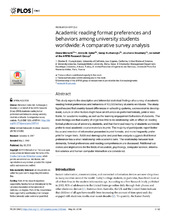Academic reading format preferences and behaviors among university students worldwide: A comparative survey analysis
| dc.contributor.author | Mizrachi, Diane | |
| dc.contributor.author | Salaz, Alicia M. | |
| dc.contributor.author | Kurbanoglu, Serap | |
| dc.contributor.author | Boustany, Joumana | |
| dc.contributor.author | Todorova, Tania | |
| dc.contributor.author | Yantao, Pan | |
| dc.contributor.author | Zhang, Jiuzhen | |
| dc.contributor.author | Zivkovic, Daniela | |
| dc.contributor.author | Pešut, Darija | |
| dc.contributor.author | Kortelainen, Terttu | |
| dc.contributor.author | Bar-Ilan, Judit | |
| dc.contributor.author | Aharony, Noa | |
| dc.contributor.author | Collina, Elena | |
| dc.contributor.author | Krumina, Liga | |
| dc.contributor.author | Geagea, Hanady | |
| dc.contributor.author | Ghinculov, Silvia | |
| dc.contributor.author | Landøy, Ane | |
| dc.contributor.author | Gastinger, Almuth | |
| dc.contributor.author | de la Vega, Aurora | |
| dc.contributor.author | Terra, Ana Lucia | |
| dc.contributor.author | Johnston, Nicole | |
| dc.contributor.author | Repanovici, Angela | |
| dc.contributor.author | Vilar, Polona | |
| dc.contributor.author | Schneider, René | |
| dc.contributor.author | Dogan, Güleda | |
| dc.contributor.author | Jamal, Patricia | |
| dc.contributor.author | Bawden, David | |
| dc.contributor.author | Secker, Jane | |
| dc.contributor.author | Morrison, Chris | |
| dc.date.accessioned | 2018-08-09T08:19:04Z | |
| dc.date.available | 2018-08-09T08:19:04Z | |
| dc.date.issued | 2018-05-30 | |
| dc.identifier.issn | 1932-6203 | |
| dc.identifier.uri | https://hdl.handle.net/1956/18032 | |
| dc.description.abstract | This study reports the descriptive and inferential statistical findings of a survey of academic reading format preferences and behaviors of 10,293 tertiary students worldwide. The study hypothesized that country-based differences in schooling systems, socioeconomic development, culture or other factors might have an influence on preferred formats, print or electronic, for academic reading, as well as the learning engagement behaviors of students. The main findings are that country of origin has little to no relationship with or effect on reading format preferences of university students, and that the broad majority of students worldwide prefer to read academic course materials in print. The majority of participants report better focus and retention of information presented in print formats, and more frequently prefer print for longer texts. Additional demographic and post-hoc analysis suggests that format preference has a small relationship with academic rank. The relationship between task demands, format preferences and reading comprehension are discussed. Additional outcomes and implications for the fields of education, psychology, computer science, information science and human-computer interaction are considered. | en_US |
| dc.language.iso | eng | eng |
| dc.publisher | Public Library of Science | eng |
| dc.rights | Attribution CC BY | eng |
| dc.rights.uri | http://creativecommons.org/licenses/by/4.0/ | eng |
| dc.title | Academic reading format preferences and behaviors among university students worldwide: A comparative survey analysis | eng |
| dc.type | Peer reviewed | |
| dc.type | Journal article | |
| dc.description.version | publishedVersion | |
| dc.rights.holder | Copyright 2018 Mizrachi et al. | eng |
| dc.source.articlenumber | e0197444 | |
| dc.identifier.doi | https://doi.org/10.1371/journal.pone.0197444 | |
| dc.source.journal | PLoS ONE | |
| dc.source.40 | 13 | |
| dc.source.14 | 5 |

